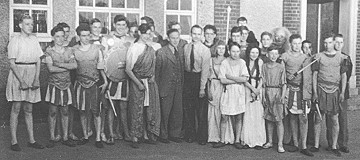


Although the full-length production by a school of a Shakespeare play offers to those taking part a more substantial and lasting benefit than the production of short plays or most modern plays, such an undertaking, demanding a large cast, capable of speaking verse and interpreting varied and subtle characters is certainly a formidable one. This is true even when a school has a number of boys with acting experience and good stage facilities; particularly does such an undertaking require courage after a break of seven years in school play production, with an inexperienced cast and on a stage which, despite the wise use of simple sets, remains small and creaking. The Lewes County School for Boys is therefore to be warmly commended upon its fresh and intelligent production of "Julius Caesar".
Of the chief merits of the production the most noticeable and pleasing was the high standard of the speaking, which showed a good sense of rhythm and, above all, intelligent intonation. Again and again the meaning of lines perhaps staled by familiarity for some or containing a rather difficult word or phrase for others was fully brought out by correct emphasis or intonation, and all members of the audience, whether the play was well-known or unknown to them, should have grasped the full sense of every line. Another pleasing feature of the production was a good second half, particularly the last act, which had a smooth, determined movement that well brought out the tragedy of the play. The first half at least in the afternoon performance was rather too slow and disjointed. The quarrel scene, with its contrasts of mood and speed, was admirable, the lighting change at the appearance of Caesar's spirit helping to make that somewhat difficult moment effective. Again, the battle scenes, always a problem for the producer, were effective, the temptation to indulge in excessive and confusing skirmishing with unnecessary numbers of soldiers having been successfully resisted, and the suicides of Brutus and Cassius were well managed. The whole performance, in fact, gave evidence of thoughtful planning and careful rehearsing. The positioning of the characters on the stage, for example, was good throughout, and the grouping, particularly in the scenes in the Capitol and Forum, was noticeably effective. The moment of Caesar's assassination, too, was striking and dramatic.
A number of other points call perhaps for some comment. The inexperience of the actors showed most obviously in gesture. They must remember that nothing so quickly distracts the audience and makes unconvincing the characterisation as fidgety, half-hearted, and incomplete gestures. Every movement of the feet, arms, hands, head and eyes must be deliberate and have a precise purpose. The crowd scenes suffered to a certain extent from the self-consciousness of some members of the crowd. In the opening scene they were too quiet and still for a Roman holiday, and in the Forum scene there was insufficient suggestion of a continuous undercurrent of feeling and noise during the speeches of Brutus and Antony and at the breaks in and between the speeches. Certainly at the main specified pauses the crowd was vociferous enough, but there were some short awkward silences and rather too marked a difference and too sudden a transition between the silences and the climaxes of sound.

The cast as a whole was admirably uniform and well matched. The chief parts were played with a good sense of character: Brutus's calm and detached manner, Caesar's aloofness, almost arrogance, and Antony's anger at the conspirators and his love for Caesar (an aspect of Antony often overlooked) were all clearly portrayed, though rather more flexibility in Caesar and more pace in Antony would have been desirable. Norman Lelliott deserves particular congratulation on his performance as Cassius. The whole character was well realised, and certain aspects of it, Cassius's quickness and relentlessness, and his misgivings over Brutus's decisions, he brought out clearly. Moreover he made good use of facial expression, spoke well, and remembered to play his part when not speaking. Roy Jarvis as Calpurnia and Cedric Andrews as Portia looked and sounded their parts, while Peter Osborne as Niarullus, Nietellus and Niessala, Anthony Greenway as the soothsayer, and Colin Oxley as Octavius were all impressive. Lastly, a word of praise to John Hall, who, as the cobbler (fourth citizen) and Strato, never forgot to act the whole time he was on the stage, and to John Hall (Lucius) for his singing in the scene in Brutus's tent.
Altogether a very creditable performance which augurs well for future productions, and all who took patt, and particularly the producer, Mr. Silk are to be warmly congratulated.
CHARACTERS
|
|
Citizens, Servants, Messengers, Soldiers - Ian Jamieson, Derek Cardy, Brian Glenister, Edward Williams, Ernest Fears, John Bird, Eric Goodman, Michael Noakes, Arthur Horswell, Richard Field, Richard Stephens, Peter Still, Michael Stevens, Ross Wells.
Lights - John Barton, John Lea, Richard Larkin. Effects - Derek Burden. Properties - Roy Gates. Call Boy - Gerald Purbrook. Stage - Stewart Symons, John Craig, Michael Dorling, Peter Tompsett. Music - Keith Divall, Dennis Hall, John White, Bryan Barton.
Lighting - H. Hoggins. Costumes-R. Gillam and Miss U.Smith. Stage - F. Larwill and R. Page. Make-up - H. Davies. Stage Manager - W. Euston. Front of House Manager - F. O'Brien. Music - G. Austin. Back of House Manager - H. Tayler. Producer - C. Silk.